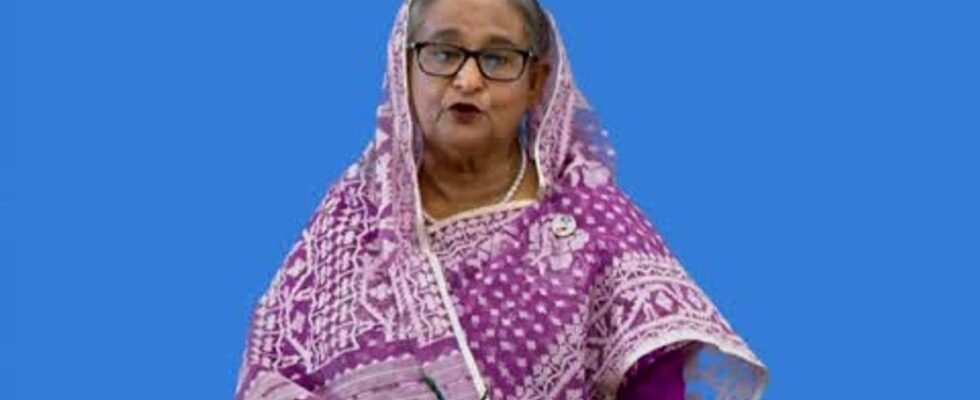In the Bangladeshi capital Dhaka, thousands of people have gathered in the streets. They cheer and clap, because now they have achieved something they have demonstrated for weeks: Prime Minister Sheikh Hasina has just stepped down from power. Hordes of protesters have marched through the capital Dhaka and broken into the palace. There are now thousands of people, write the Bangladeshi newspaper Prothom Alo Daily. But Hasina was not there. She escaped her palace in a military helicopter just before, says a source to AFP. This helicopter left Bangladesh’s capital Dhaka on Monday. On board was probably Prime Minister Sheikh Hasina. Photo: Reuters TV / Reuters Most violent protests in the country’s history CNN reports that Hasina has now landed in Agartala, the capital of the Indian state of Tripura, together with her sister. India should have offered her a safe escape route. The protests in Bangladesh in recent weeks have been among the most violent since the country became an independent state over 50 years ago. At least 300 have been killed in the protests. 11,000 have been arrested, and both schools and universities are closed. Prime Minister Sheikh Hasina has fled the country. In the picture, she is giving a speech at a vandalized subway station earlier this summer. Photo: Bangladesh Prime Minister’s Office / AFP On Sunday alone, at least 94 people were killed, including 14 police officers. It was the deadliest day since the demonstrations began last month. A direct protest against Hasina Dei started as a student protest against a controversial quota system for jobs in the Bangladeshi administration. The system gave one in three public jobs to family members of veterans from the 1971 war of independence. Protesters cheer after receiving the news that the prime minister has resigned. Photo: Rajib Dhar / AP – Quite quickly it developed into a protest against the prime minister, says Arild Engelsen Ruud, professor of South Asian studies at the University of Oslo, to news. He said that many were hired by the board of Prime Minister Sheikh Hasina. Her critics have been thrown in prison, corruption has been extensive and nepotism widespread. UiO professor Arild Engelsen Ruud believes that the protests in Bangladesh can give the country new opportunities. Photo: Olaf Christensen At the same time, Bangladesh has faced economic challenges, according to Ruud: – Suddenly it exploded and became a direct protest against her and the rather corrupt and complacent regime she represented, he says. – So this is big. But what will happen in the future is very uncertain. – The time has come On Monday, the demonstrators had planned a demonstration train with demands for Hasina’s resignation. Most Bangladeshis lost access to the internet, and security forces marched in the streets to enforce a curfew. Several offices and more than 3,500 textile factories closed. Soldiers and police barricaded several streets leading to Hasina’s office with barbed wire, but huge crowds made it past the obstacles. The Business Standard estimates that 400,000 protesters were in the streets, but this has not been confirmed. Soldiers block one of the main streets in Dhaka. Photo: MUNIR UZ ZAMAN / AFP – The time has come for the last protest, said Asif Mahmud, one of the leaders of the demonstration, to AFP. The army will form a transitional government. Hasina has been prime minister since 2009. In January, she won her fourth election in a row, without any real opposition. Hasina is the daughter of Sheikh Mujibur Rahman, one of the founders of the independent state of Bangladesh. He became the country’s first president and later prime minister. Big cheers. Photo: Mohammad Ponir Hossain / Reuters On Monday, videos on social media showed protesters climbing a large statue of Rahman in central Dhaka. They chop off pieces of the statue’s face. The head of the Bangladeshi military, General Waker-Uz-Zama, asks the people to trust the army no. He also confirms that a transitional government with him at the head will govern the country. – Give us some time. We will find a solution, he says. Demonstrations against Hasina on Saturday. Photo: MUNIR UZ ZAMAN / AFP – We are at an early stage of talks with the largest opposition parties and representatives from civil society – but not from Hasina’s party, says the general. Can provide new opportunities Since demonstrations against Hasina broke out in July, the prime minister has sent the military on the demonstrators. They have fired sharply at students and others who have protested in the streets in recent weeks. But today Waker-Uz-Zuma is on a team with the students. – Now your job is to keep yourself calm and help us, he says. UiO professor Arild Engelsen Ruud says that one is in “unclear constitutional waters”. Normally, the parliament would appoint a new prime minister. But as the political leadership in Bangladesh consists of people who have been appointed by Sheikh Hasina, they have no legitimacy among the people. People have poured into the streets to celebrate Hasina’s resignation. It has been a target for several thousand Protestants. Photo: Mohammad Ponir Hossain / Reuters – It is difficult to see how there will be an arrangement that is generally accepted, says Ruud. At the same time, he believes that this may be able to overcome nepotism and corruption: – Perhaps completely new possibilities are opening up now, he says. Interested in foreign affairs? Listen to the foreign affairs editor’s podcast: Published 05.08.2024, at 11.20 Updated 05.08.2024, at 2:30 p.m
ttn-69
Bangladesh’s prime minister resigns after large protests – news Urix – Foreign news and documentaries

